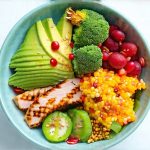Navigating life often means encountering days where our bodies simply aren’t cooperating – those times when sensitivity reigns supreme. This could stem from hormonal fluctuations, digestive discomfort, stress, or a myriad of other internal factors. On these sensitive days, the usual routines that support well-being can feel…impossible. The thought of a vibrant salad might induce nausea, while a comforting bowl of noodles might seem overwhelming. It’s crucial to recognize that forcing rigid dietary adherence during these periods often backfires, creating more stress and potentially exacerbating symptoms. Instead, prioritizing both gentle nutrition and genuine comfort becomes paramount – a delicate balancing act that acknowledges our body’s needs without succumbing to solely restrictive or indulgent patterns.
This isn’t about abandoning healthy habits; it’s about adapting them. It’s about listening deeply to what your body is communicating and responding with kindness, not control. We often associate “healthy eating” with strict rules and limitations, but true wellness encompasses flexibility and self-awareness. The goal on sensitive days isn’t perfection, it’s support. How can we nourish our bodies without adding to the discomfort? How can we find foods that are easily digestible, emotionally soothing, and contribute to a sense of calm amidst internal turmoil? This article explores practical strategies for achieving this balance, focusing on mindful choices and gentle approaches.
Prioritizing Gentle Digestion
The digestive system is often one of the first areas to signal distress when sensitivity levels rise. A normally robust gut can become incredibly reactive, leading to bloating, nausea, or changes in bowel habits. Therefore, prioritizing easily digestible foods is essential. This doesn’t mean eliminating entire food groups; it simply means making informed choices that minimize strain on your system. Focusing on “food as fuel” becomes less important than focusing on “food as non-irritation.” Think about what sits lightly in your stomach, rather than what’s deemed the most nutritious in general circumstances.
Foods to consider include well-cooked vegetables (steamed or roasted are often better tolerated than raw), lean proteins like chicken or fish prepared simply (baked or poached instead of fried), and easily digestible carbohydrates such as white rice, mashed sweet potatoes, or plain toast. Conversely, foods known to be more challenging for digestion – highly processed items, greasy or fried foods, excessive fiber, spicy dishes, and carbonated beverages – are best avoided on these days. Even healthy foods like broccoli or beans can become problematic if your system is already sensitive. If you struggle with identifying what causes issues, consider reviewing recognize and treat bloating.
It’s also important to consider how you eat. Slowing down, chewing thoroughly, and eating smaller, more frequent meals throughout the day can significantly ease the digestive burden. Rushing through a meal or consuming large portions puts unnecessary stress on your system. Hydration is key too; sipping water throughout the day helps with digestion and prevents constipation, but avoid drinking large amounts during meals as this can dilute digestive enzymes. Ultimately, listening to your body’s cues – paying attention to what feels good versus what causes discomfort – is the most valuable guide. Understanding gut transit can also help inform these choices.
Soothing Choices for Common Sensitivities
Many sensitivities manifest in specific ways, dictating slightly different nutritional approaches. For example, someone experiencing hormonal fluctuations might find that incorporating magnesium-rich foods (like spinach or dark chocolate – in moderation!) can help mitigate mood swings and bloating. Individuals with heightened nausea often benefit from the BRAT diet: Bananas, Rice, Applesauce, and Toast. These foods are bland, easy to digest, and can help bind the digestive system. Ginger, known for its anti-nausea properties, can be consumed as tea or added to meals in small amounts.
For those experiencing heightened gut discomfort, identifying potential trigger foods is crucial. This might involve keeping a food diary to track what you eat and how it makes you feel. Common culprits include dairy, gluten, caffeine, alcohol, and artificial sweeteners. While eliminating these foods shouldn’t be done impulsively without professional guidance, temporarily removing them from your diet can help determine if they are contributing to your symptoms. Remember: elimination is for investigation, not necessarily permanent restriction. You may find it helpful to explore food limitations in these situations.
Finally, consider the role of probiotics. A healthy gut microbiome plays a vital role in overall well-being and can help regulate digestion. Incorporating probiotic-rich foods like yogurt (if tolerated) or kefir, or taking a high-quality probiotic supplement, might offer some relief during sensitive periods. However, it’s important to note that probiotics affect everyone differently; what works for one person may not work for another.
The Emotional Component of Food
Food is rarely just about nutrition; it’s deeply intertwined with our emotions and memories. On sensitive days, emotional needs become even more pronounced. Comfort food often isn’t chosen for its nutritional value but for the sense of safety and familiarity it provides. Denying yourself these comforts entirely can lead to feelings of deprivation and guilt, potentially exacerbating your distress. Allowing space for gentle indulgence is an act of self-compassion.
The key is mindful comfort eating. Instead of mindlessly devouring a large quantity of unhealthy food, choose a smaller portion of something that genuinely brings you joy. This could be a cup of herbal tea, a small piece of dark chocolate, or a warm bowl of soup. Savor each bite and focus on the sensory experience – the taste, texture, and aroma. Avoid eating in front of the TV or while distracted, as this can lead to overeating.
Furthermore, recognize that cravings are often signals from your body, not signs of weakness. They might indicate a need for specific nutrients or simply a desire for emotional soothing. Instead of fighting them, try to address the underlying cause. If you’re craving sugar, perhaps you’re lacking energy and could benefit from a small snack with protein and complex carbohydrates. If you’re craving salty foods, you might be dehydrated and need to replenish your electrolytes. When navigating these sensitivities, finding comfort foods can make a big difference.
Hydration and Restorative Beverages
Staying adequately hydrated is paramount on sensitive days, but not all beverages are created equal. While water should always be the primary choice, certain herbal teas can offer additional benefits. Chamomile tea, known for its calming properties, can help reduce anxiety and promote relaxation. Peppermint tea can soothe digestive discomfort and alleviate nausea. Ginger tea, as mentioned earlier, is excellent for combating nausea.
Avoid caffeinated beverages, sugary drinks, and alcohol, as these can exacerbate symptoms or interfere with sleep. Even seemingly innocuous fruit juices can sometimes be irritating to a sensitive gut. Consider electrolyte-rich beverages like coconut water or diluted sports drinks (low in sugar) if you’re experiencing dehydration due to vomiting or diarrhea. If dealing with discomfort from gas, it may be useful to distinguish between stomach and colon gas.
Beyond specific beverages, the temperature of your drink can also play a role. Some people find that warm beverages are more soothing and easier to digest than cold ones. Experiment to see what feels best for you. Finally, remember that hydration isn’t just about drinking fluids; it’s also about consuming water-rich foods like fruits and vegetables. And don’t forget to plan ahead if you have special events coming up – learning how to avoid bloating can make all the difference!


















